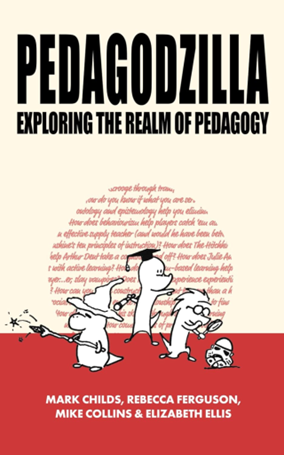 Have you ever wondered what the connection
between a Muppets’ Christmas Carol and transformative learning might be? Have
you pondered how behaviourism might help players catch ‘em all in Pokemon Go?
Was the Council of Elrond in The Lord of the Rings really a good example of
social constructivism?
Have you ever wondered what the connection
between a Muppets’ Christmas Carol and transformative learning might be? Have
you pondered how behaviourism might help players catch ‘em all in Pokemon Go?
Was the Council of Elrond in The Lord of the Rings really a good example of
social constructivism?
Well, wonder no more! Based on the popular Pedagodzilla Podcast, Pedagodzilla: Exploring the Realm of Pedagogy isn’t just another book on learning theories. We have taken the major paradigms, examined them through the lenses of pop culture, and distilled our answers into valuable tips for practice.
Throughout the book we demystify the mistiest of pedagogies, and unearth some extremely varied pop culture references, making it relevant to any educator (or enjoyer of nerdy pastimes).
In the original podcast, hosts Michael Collins (The Open University) and Dr Mark Childs (Durham University) select an area of pedagogy/learning theory and apply a pop culture analogy to it, unpacking it in an accessible, entertaining way. The podcast has grown immensely in popularity, with more than 20,000 downloads since it began in 2019.
The first episode featured a conversation about Communities of Practice, linked to pop culture by Oliver and Carr (2003) by way of World of Warcraft. The narrative has continued ever since. Pedagodzilla is the story of Mike’s journey to learning more about pedagogy and Mark’s opportunity to offload his pent-up geekiness. Regular guest, Professor Rebecca Ferguson (The Open University), became the third ‘Zilla’ to make the leap from podcast to page. But rather than a ‘book of the podcast’, Pedagodzilla: Exploring the Realm of Pedagogy provides readers with a new way to access pedagogy and pop culture (pedagogy is crunchy and tastes good with ketchup).
Each chapter includes a QR code that takes you to the podcast episode that accompanies the chapter, where you can hear education professionals digging into their pop culture passions and pondering paradigms.
We’re pleased to release this book as both an OER (Open Educational Resource) under the Creative Commons 4.0 Attribution-NonCommercial-NoDerivatives license and as a paperback. This means you can use it in your own teaching and practice and share it (just make sure to name drop it and, if you’re feeling generous, let us know!).
And if that whets your appetite for playful pedagogues posing preposterous questions then you should listen to more at pedagodzilla.com.



Rate and Review
Rate this article
Review this article
Log into OpenLearn to leave reviews and join in the conversation.
Article reviews